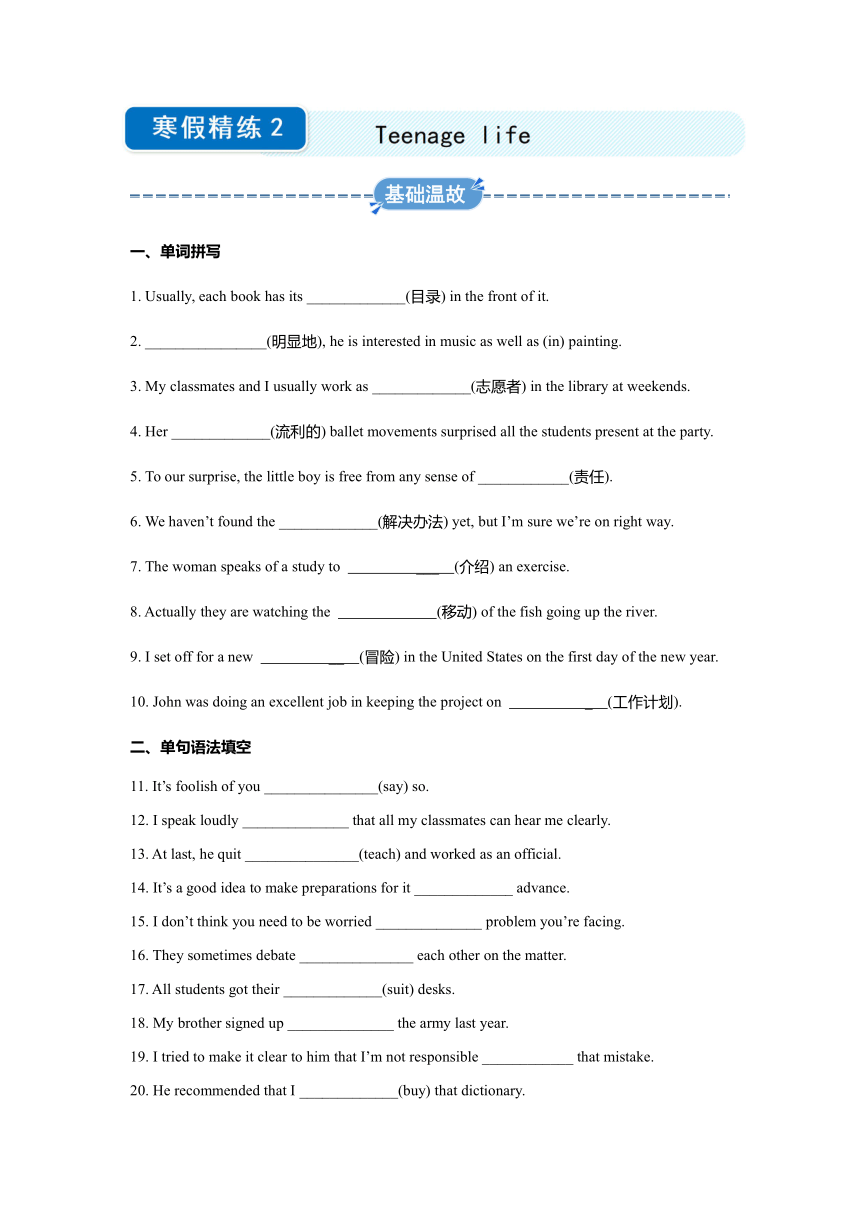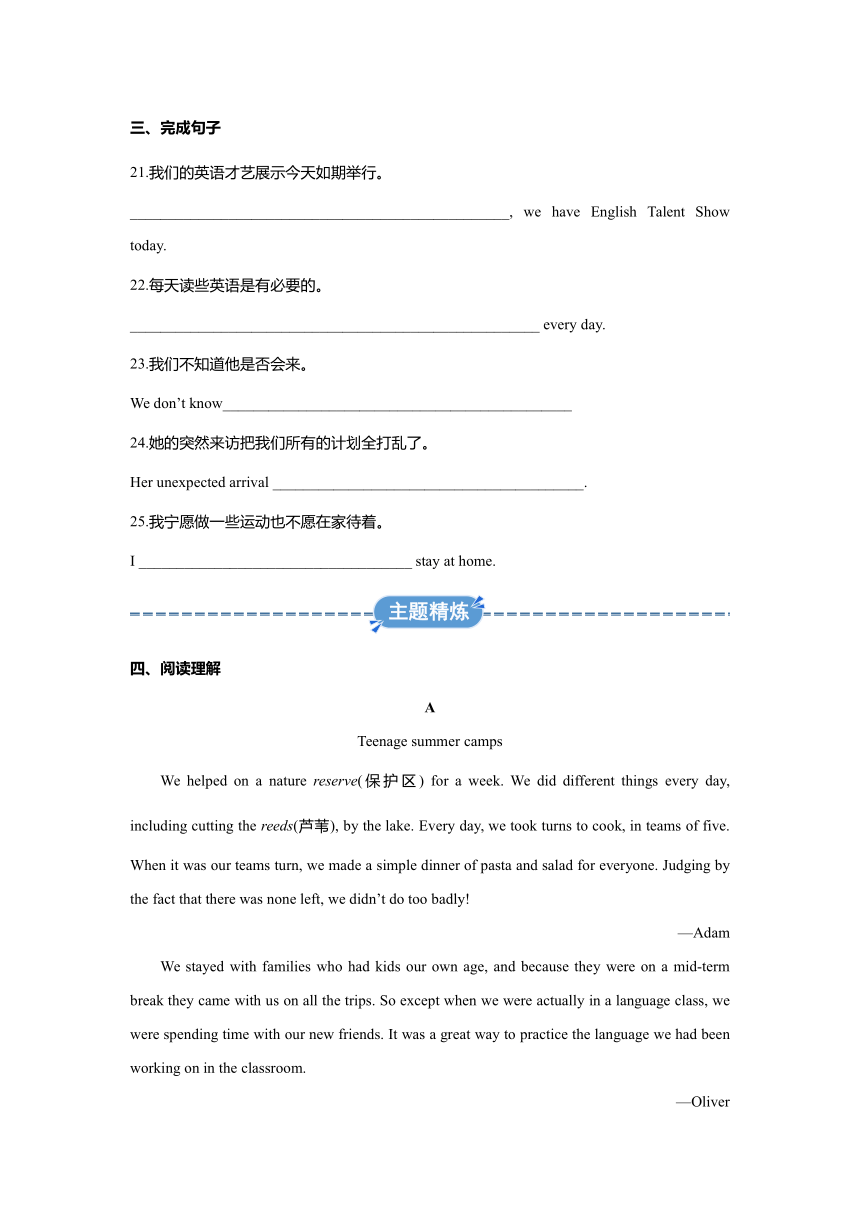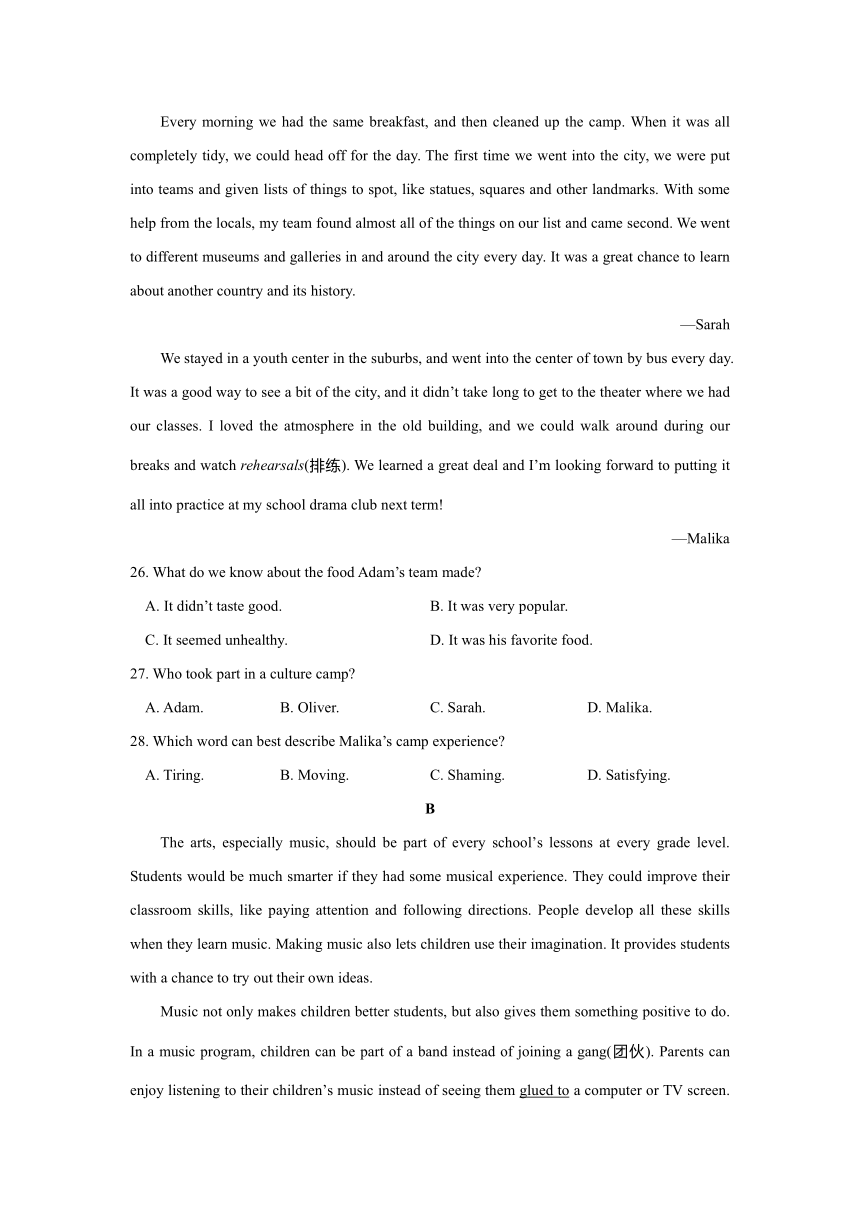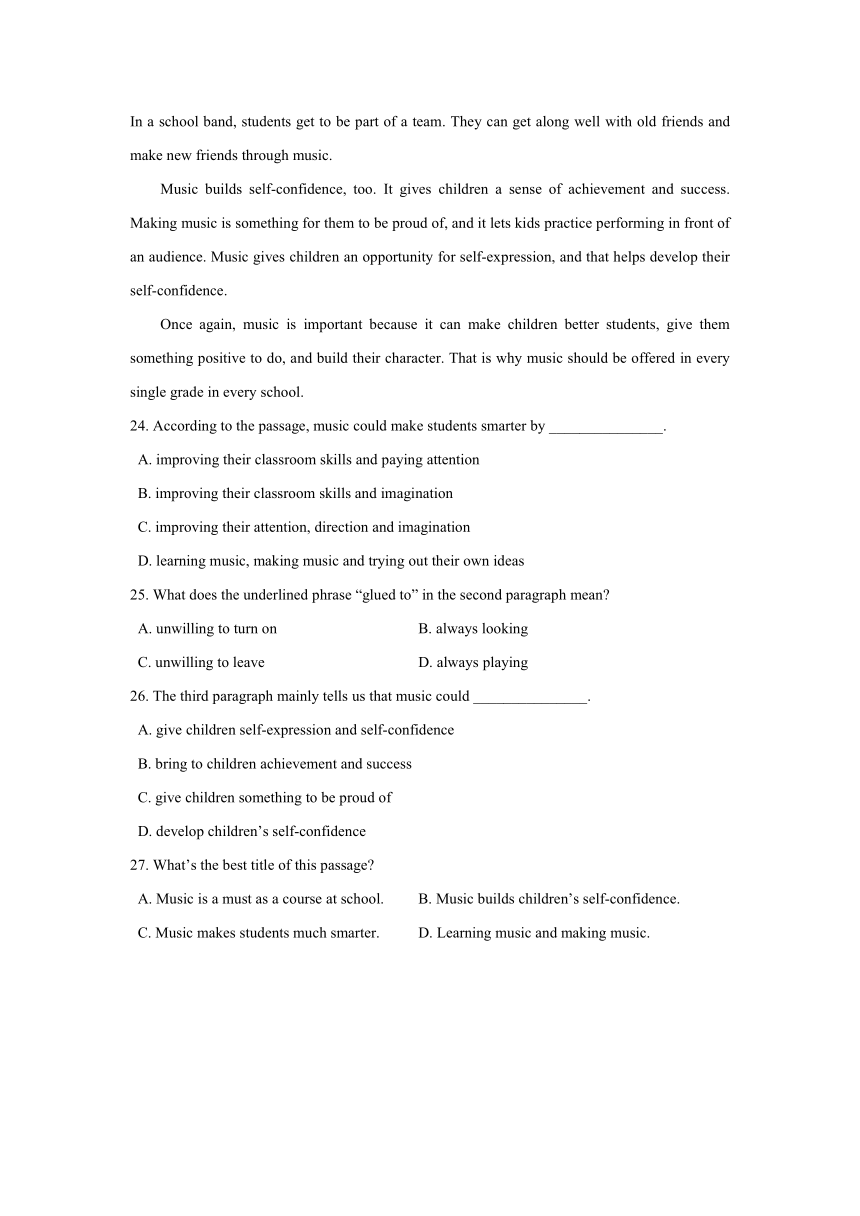新教材2019-2020学年上学期高一英语 寒假精练2Unit 1 Teenage life
文档属性
| 名称 | 新教材2019-2020学年上学期高一英语 寒假精练2Unit 1 Teenage life |

|
|
| 格式 | zip | ||
| 文件大小 | 67.9KB | ||
| 资源类型 | 教案 | ||
| 版本资源 | 人教版(2019) | ||
| 科目 | 英语 | ||
| 更新时间 | 2019-12-25 00:00:00 | ||
图片预览




文档简介
一、单词拼写
1.
Usually,
each
book
has
its
_____________(目录)
in
the
front
of
it.
2.
________________(明显地),
he
is
interested
in
music
as
well
as
(in)
painting.
3.
My
classmates
and
I
usually
work
as
_____________(志愿者)
in
the
library
at
weekends.
4.
Her
_____________(流利的)
ballet
movements
surprised
all
the
students
present
at
the
party.
5.
To
our
surprise,
the
little
boy
is
free
from
any
sense
of
____________(责任).
6.
We
haven’t
found
the
_____________(解决办法)
yet,
but
I’m
sure
we’re
on
right
way.
7.
The
woman
speaks
of
a
study
to
___
(介绍)
an
exercise.
8.
Actually
they
are
watching
the
(移动)
of
the
fish
going
up
the
river.
9.
I
set
off
for
a
new
__
(冒险)
in
the
United
States
on
the
first
day
of
the
new
year.
10.
John
was
doing
an
excellent
job
in
keeping
the
project
on
_
(工作计划).
二、单句语法填空
11.
It’s
foolish
of
you
_______________(say)
so.
12.
I
speak
loudly
______________
that
all
my
classmates
can
hear
me
clearly.
13.
At
last,
he
quit
_______________(teach)
and
worked
as
an
official.
14.
It’s
a
good
idea
to
make
preparations
for
it
_____________
advance.
15.
I
don’t
think
you
need
to
be
worried
______________
problem
you’re
facing.
16.
They
sometimes
debate
_______________
each
other
on
the
matter.
17.
All
students
got
their
_____________(suit)
desks.
18.
My
brother
signed
up
______________
the
army
last
year.
19.
I
tried
to
make
it
clear
to
him
that
I’m
not
responsible
____________
that
mistake.
20.
He
recommended
that
I
_____________(buy)
that
dictionary.
三、完成句子
21.我们的英语才艺展示今天如期举行。
__________________________________________________,
we
have
English
Talent
Show
today.
22.每天读些英语是有必要的。
______________________________________________________
every
day.
23.我们不知道他是否会来。
We
don’t
know______________________________________________
24.她的突然来访把我们所有的计划全打乱了。
Her
unexpected
arrival
_________________________________________.
25.我宁愿做一些运动也不愿在家待着。
I
____________________________________
stay
at
home.
四、阅读理解
A
Teenage
summer
camps
We
helped
on
a
nature
reserve(保护区)
for
a
week.
We
did
different
things
every
day,
including
cutting
the
reeds(芦苇),
by
the
lake.
Every
day,
we
took
turns
to
cook,
in
teams
of
five.
When
it
was
our
teams
turn,
we
made
a
simple
dinner
of
pasta
and
salad
for
everyone.
Judging
by
the
fact
that
there
was
none
left,
we
didn’t
do
too
badly!
—Adam
We
stayed
with
families
who
had
kids
our
own
age,
and
because
they
were
on
a
mid-term
break
they
came
with
us
on
all
the
trips.
So
except
when
we
were
actually
in
a
language
class,
we
were
spending
time
with
our
new
friends.
It
was
a
great
way
to
practice
the
language
we
had
been
working
on
in
the
classroom.
—Oliver
Every
morning
we
had
the
same
breakfast,
and
then
cleaned
up
the
camp.
When
it
was
all
completely
tidy,
we
could
head
off
for
the
day.
The
first
time
we
went
into
the
city,
we
were
put
into
teams
and
given
lists
of
things
to
spot,
like
statues,
squares
and
other
landmarks.
With
some
help
from
the
locals,
my
team
found
almost
all
of
the
things
on
our
list
and
came
second.
We
went
to
different
museums
and
galleries
in
and
around
the
city
every
day.
It
was
a
great
chance
to
learn
about
another
country
and
its
history.
—Sarah
We
stayed
in
a
youth
center
in
the
suburbs,
and
went
into
the
center
of
town
by
bus
every
day.
It
was
a
good
way
to
see
a
bit
of
the
city,
and
it
didn’t
take
long
to
get
to
the
theater
where
we
had
our
classes.
I
loved
the
atmosphere
in
the
old
building,
and
we
could
walk
around
during
our
breaks
and
watch
rehearsals(排练).
We
learned
a
great
deal
and
I’m
looking
forward
to
putting
it
all
into
practice
at
my
school
drama
club
next
term!
—Malika
26.
What
do
we
know
about
the
food
Adam’s
team
made
A.
It
didn’t
taste
good.
B.
It
was
very
popular.
C.
It
seemed
unhealthy.
D.
It
was
his
favorite
food.
27.
Who
took
part
in
a
culture
camp
A.
Adam.
B.
Oliver.
C.
Sarah.
D.
Malika.
28.
Which
word
can
best
describe
Malika’s
camp
experience
A.
Tiring.
B.
Moving.
C.
Shaming.
D.
Satisfying.
B
The
arts,
especially
music,
should
be
part
of
every
school’s
lessons
at
every
grade
level.
Students
would
be
much
smarter
if
they
had
some
musical
experience.
They
could
improve
their
classroom
skills,
like
paying
attention
and
following
directions.
People
develop
all
these
skills
when
they
learn
music.
Making
music
also
lets
children
use
their
imagination.
It
provides
students
with
a
chance
to
try
out
their
own
ideas.
Music
not
only
makes
children
better
students,
but
also
gives
them
something
positive
to
do.
In
a
music
program,
children
can
be
part
of
a
band
instead
of
joining
a
gang(团伙).
Parents
can
enjoy
listening
to
their
children’s
music
instead
of
seeing
them
glued
to
a
computer
or
TV
screen.
In
a
school
band,
students
get
to
be
part
of
a
team.
They
can
get
along
well
with
old
friends
and
make
new
friends
through
music.
Music
builds
self-confidence,
too.
It
gives
children
a
sense
of
achievement
and
success.
Making
music
is
something
for
them
to
be
proud
of,
and
it
lets
kids
practice
performing
in
front
of
an
audience.
Music
gives
children
an
opportunity
for
self-expression,
and
that
helps
develop
their
self-confidence.
Once
again,
music
is
important
because
it
can
make
children
better
students,
give
them
something
positive
to
do,
and
build
their
character.
That
is
why
music
should
be
offered
in
every
single
grade
in
every
school.
24.
According
to
the
passage,
music
could
make
students
smarter
by
_______________.
A.
improving
their
classroom
skills
and
paying
attention
B.
improving
their
classroom
skills
and
imagination
C.
improving
their
attention,
direction
and
imagination
D.
learning
music,
making
music
and
trying
out
their
own
ideas
25.
What
does
the
underlined
phrase
“glued
to”
in
the
second
paragraph
mean
A.
unwilling
to
turn
on
B.
always
looking
C.
unwilling
to
leave
D.
always
playing
26.
The
third
paragraph
mainly
tells
us
that
music
could
_______________.
A.
give
children
self-expression
and
self-confidence
B.
bring
to
children
achievement
and
success
C.
give
children
something
to
be
proud
of
D.
develop
children’s
self-confidence
27.
What’s
the
best
title
of
this
passage
A.
Music
is
a
must
as
a
course
at
school.
B.
Music
builds
children’s
self-confidence.
C.
Music
makes
students
much
smarter.
D.
Learning
music
and
making
music.
一、单词拼写
【答案】
1.
content
2.
Obviously
3.
volunteers
4.
fluent
5.
responsibility
6.
solution
7.
recommend
8.
advances
9.
adventure
10.
schedule
二、单句语法填空
【答案】
11.
to
say
12.
so
13.
teaching
14.
in
15.
about
16.
with
17.
suitable
18.
for
19.
for
20.
should
buy
【解析】
11.考查固定句式。句意:你这样说真是太傻了。固定句式It’s
foolish
of
sb.
to
do
sth.“某人做某事是愚蠢的”,故填to
say。
12.考查固定短语。句意:我大声说话,以便所有的同学都能听清楚。固定短语so
that“以便;所以”。故填so。
13.考查固定短语。句意:最后,他辞去了教书的工作,当了一名官员。短语quit
doing
sth.“放弃做某事;辞职”,故填teaching。
14.考查固定短语。句意:提前做好准备是个好主意。短语in
advance“提前;预先”,故填in。
15.考查固定短语。句意:我认为你不必担心你所面临的问题。短语be
worried
about
sth.“担心某事”,故填about。
16.考查固定短语。句意:他们有时就这个问题互相辩论。短语debate
with“与……争辩”,故填with。
17.考查形容词。句意:所有的学生都得到了合适的桌子。desk为名词,需要形容词修饰,故填suitable。
18.考查固定短语。句意:我哥哥去年参军了。短语sign
up
for“报名参加”,故填for。
19.考查固定短语。句意:我试图让他明白我对那个错误没有责任。短语be
responsible
for“对……负责”,故填for。
20.考查虚拟语气。句意:他建议我买那本字典。recommend表示“命令,决定,建议”引导的that从句中,要用虚拟语气,其谓语动词形式为“should+动词原形”,其中should可以省略,主句中的时态不限。故填should
buy。
三、完成句子
【答案】
21.
As
scheduled
22.
It
is
necessary
to
read
some
English
23.
whether
he
will
come
24.
disturbed
all
our
plans
25.
would
rather
do
some
sports
than
四、阅读理解
A
【答案】26-28
BCD
【解析】这是一篇说明文。主要是四个学生描述各自的青少年夏令营经历。
26.细节理解题。根据第一段最后一句“Judging
by
the
fact
that
there
was
none
left,
we
didn’t
do
too
badly!”(从一样事物都没剩的事实来判断,我们做得不太糟!)可知亚当的团队做的食物非常受欢迎。故选B。
27.推理判断题。根据第三段中“We
went
to
different
museums
and
galleries
in
and
around
the
city
every
day.
It
was
a
great
chance
to
learn
about
another
country
and
its
history.”(我们每天都去不同的博物馆和美术馆。这是一个了解另一个国家及其历史的好机会。)依据Sarah去的地方是博物馆和美术馆这些与文化相关的地方,可以推断Sarah参加了一个文化夏令营。故选C。
28.推理判断题。根据最后一段中“I
loved
the
atmosphere
in
the
old
building,
and
we
could
walk
around
during
our
breaks
and
watch
rehearsals.
We
learned
a
great
deal
and
I’m
looking
forward
to
putting
it
all
into
practice
at
my
school
drama
club
next
term!”
(我喜欢老建筑里的气氛,我们可以在休息时间四处走走,看排练。我们学到了很多东西,我期待下学期在学校戏剧俱乐部把这些都付诸实践!)可推知Malika的夏令营经历是令人满意的。故选D。
B
【答案】29-32
BCDA
29.细节理解题。根据第一段“They
could
improve
their
classroom
skills”和“Making
music
also
lets
children
use
their
imagination”可知,音乐通过提高学生的课堂技能和发挥他们的想象力,使其更加聪明。
30.
词义猜测题。“Parents
can
enjoy
listening
to
their
children’s
music
instead
of
seeing
them
glued
to
a
computer
or
TV
screen.”句意:家长们能享受孩子们的音乐,而不是看他们不愿离开电脑或电视。glue的原意“似胶般固着于”,这里引申为“不愿离开”。
31.
段落大意题
根据第三段首句“Music
builds
self-confidence,
too.”音乐也建立自信可知,D为正确答案。
32.标题概括题
第一段第一句“The
arts,
especially
music,
should
be
part
of
every
school’s
lessons
at
every
grade
level.”即本篇文章的主题句。根据概括标题需遵循“征对性、概括性、醒目性”的原则可知A为最佳答案。
1.
Usually,
each
book
has
its
_____________(目录)
in
the
front
of
it.
2.
________________(明显地),
he
is
interested
in
music
as
well
as
(in)
painting.
3.
My
classmates
and
I
usually
work
as
_____________(志愿者)
in
the
library
at
weekends.
4.
Her
_____________(流利的)
ballet
movements
surprised
all
the
students
present
at
the
party.
5.
To
our
surprise,
the
little
boy
is
free
from
any
sense
of
____________(责任).
6.
We
haven’t
found
the
_____________(解决办法)
yet,
but
I’m
sure
we’re
on
right
way.
7.
The
woman
speaks
of
a
study
to
___
(介绍)
an
exercise.
8.
Actually
they
are
watching
the
(移动)
of
the
fish
going
up
the
river.
9.
I
set
off
for
a
new
__
(冒险)
in
the
United
States
on
the
first
day
of
the
new
year.
10.
John
was
doing
an
excellent
job
in
keeping
the
project
on
_
(工作计划).
二、单句语法填空
11.
It’s
foolish
of
you
_______________(say)
so.
12.
I
speak
loudly
______________
that
all
my
classmates
can
hear
me
clearly.
13.
At
last,
he
quit
_______________(teach)
and
worked
as
an
official.
14.
It’s
a
good
idea
to
make
preparations
for
it
_____________
advance.
15.
I
don’t
think
you
need
to
be
worried
______________
problem
you’re
facing.
16.
They
sometimes
debate
_______________
each
other
on
the
matter.
17.
All
students
got
their
_____________(suit)
desks.
18.
My
brother
signed
up
______________
the
army
last
year.
19.
I
tried
to
make
it
clear
to
him
that
I’m
not
responsible
____________
that
mistake.
20.
He
recommended
that
I
_____________(buy)
that
dictionary.
三、完成句子
21.我们的英语才艺展示今天如期举行。
__________________________________________________,
we
have
English
Talent
Show
today.
22.每天读些英语是有必要的。
______________________________________________________
every
day.
23.我们不知道他是否会来。
We
don’t
know______________________________________________
24.她的突然来访把我们所有的计划全打乱了。
Her
unexpected
arrival
_________________________________________.
25.我宁愿做一些运动也不愿在家待着。
I
____________________________________
stay
at
home.
四、阅读理解
A
Teenage
summer
camps
We
helped
on
a
nature
reserve(保护区)
for
a
week.
We
did
different
things
every
day,
including
cutting
the
reeds(芦苇),
by
the
lake.
Every
day,
we
took
turns
to
cook,
in
teams
of
five.
When
it
was
our
teams
turn,
we
made
a
simple
dinner
of
pasta
and
salad
for
everyone.
Judging
by
the
fact
that
there
was
none
left,
we
didn’t
do
too
badly!
—Adam
We
stayed
with
families
who
had
kids
our
own
age,
and
because
they
were
on
a
mid-term
break
they
came
with
us
on
all
the
trips.
So
except
when
we
were
actually
in
a
language
class,
we
were
spending
time
with
our
new
friends.
It
was
a
great
way
to
practice
the
language
we
had
been
working
on
in
the
classroom.
—Oliver
Every
morning
we
had
the
same
breakfast,
and
then
cleaned
up
the
camp.
When
it
was
all
completely
tidy,
we
could
head
off
for
the
day.
The
first
time
we
went
into
the
city,
we
were
put
into
teams
and
given
lists
of
things
to
spot,
like
statues,
squares
and
other
landmarks.
With
some
help
from
the
locals,
my
team
found
almost
all
of
the
things
on
our
list
and
came
second.
We
went
to
different
museums
and
galleries
in
and
around
the
city
every
day.
It
was
a
great
chance
to
learn
about
another
country
and
its
history.
—Sarah
We
stayed
in
a
youth
center
in
the
suburbs,
and
went
into
the
center
of
town
by
bus
every
day.
It
was
a
good
way
to
see
a
bit
of
the
city,
and
it
didn’t
take
long
to
get
to
the
theater
where
we
had
our
classes.
I
loved
the
atmosphere
in
the
old
building,
and
we
could
walk
around
during
our
breaks
and
watch
rehearsals(排练).
We
learned
a
great
deal
and
I’m
looking
forward
to
putting
it
all
into
practice
at
my
school
drama
club
next
term!
—Malika
26.
What
do
we
know
about
the
food
Adam’s
team
made
A.
It
didn’t
taste
good.
B.
It
was
very
popular.
C.
It
seemed
unhealthy.
D.
It
was
his
favorite
food.
27.
Who
took
part
in
a
culture
camp
A.
Adam.
B.
Oliver.
C.
Sarah.
D.
Malika.
28.
Which
word
can
best
describe
Malika’s
camp
experience
A.
Tiring.
B.
Moving.
C.
Shaming.
D.
Satisfying.
B
The
arts,
especially
music,
should
be
part
of
every
school’s
lessons
at
every
grade
level.
Students
would
be
much
smarter
if
they
had
some
musical
experience.
They
could
improve
their
classroom
skills,
like
paying
attention
and
following
directions.
People
develop
all
these
skills
when
they
learn
music.
Making
music
also
lets
children
use
their
imagination.
It
provides
students
with
a
chance
to
try
out
their
own
ideas.
Music
not
only
makes
children
better
students,
but
also
gives
them
something
positive
to
do.
In
a
music
program,
children
can
be
part
of
a
band
instead
of
joining
a
gang(团伙).
Parents
can
enjoy
listening
to
their
children’s
music
instead
of
seeing
them
glued
to
a
computer
or
TV
screen.
In
a
school
band,
students
get
to
be
part
of
a
team.
They
can
get
along
well
with
old
friends
and
make
new
friends
through
music.
Music
builds
self-confidence,
too.
It
gives
children
a
sense
of
achievement
and
success.
Making
music
is
something
for
them
to
be
proud
of,
and
it
lets
kids
practice
performing
in
front
of
an
audience.
Music
gives
children
an
opportunity
for
self-expression,
and
that
helps
develop
their
self-confidence.
Once
again,
music
is
important
because
it
can
make
children
better
students,
give
them
something
positive
to
do,
and
build
their
character.
That
is
why
music
should
be
offered
in
every
single
grade
in
every
school.
24.
According
to
the
passage,
music
could
make
students
smarter
by
_______________.
A.
improving
their
classroom
skills
and
paying
attention
B.
improving
their
classroom
skills
and
imagination
C.
improving
their
attention,
direction
and
imagination
D.
learning
music,
making
music
and
trying
out
their
own
ideas
25.
What
does
the
underlined
phrase
“glued
to”
in
the
second
paragraph
mean
A.
unwilling
to
turn
on
B.
always
looking
C.
unwilling
to
leave
D.
always
playing
26.
The
third
paragraph
mainly
tells
us
that
music
could
_______________.
A.
give
children
self-expression
and
self-confidence
B.
bring
to
children
achievement
and
success
C.
give
children
something
to
be
proud
of
D.
develop
children’s
self-confidence
27.
What’s
the
best
title
of
this
passage
A.
Music
is
a
must
as
a
course
at
school.
B.
Music
builds
children’s
self-confidence.
C.
Music
makes
students
much
smarter.
D.
Learning
music
and
making
music.
一、单词拼写
【答案】
1.
content
2.
Obviously
3.
volunteers
4.
fluent
5.
responsibility
6.
solution
7.
recommend
8.
advances
9.
adventure
10.
schedule
二、单句语法填空
【答案】
11.
to
say
12.
so
13.
teaching
14.
in
15.
about
16.
with
17.
suitable
18.
for
19.
for
20.
should
buy
【解析】
11.考查固定句式。句意:你这样说真是太傻了。固定句式It’s
foolish
of
sb.
to
do
sth.“某人做某事是愚蠢的”,故填to
say。
12.考查固定短语。句意:我大声说话,以便所有的同学都能听清楚。固定短语so
that“以便;所以”。故填so。
13.考查固定短语。句意:最后,他辞去了教书的工作,当了一名官员。短语quit
doing
sth.“放弃做某事;辞职”,故填teaching。
14.考查固定短语。句意:提前做好准备是个好主意。短语in
advance“提前;预先”,故填in。
15.考查固定短语。句意:我认为你不必担心你所面临的问题。短语be
worried
about
sth.“担心某事”,故填about。
16.考查固定短语。句意:他们有时就这个问题互相辩论。短语debate
with“与……争辩”,故填with。
17.考查形容词。句意:所有的学生都得到了合适的桌子。desk为名词,需要形容词修饰,故填suitable。
18.考查固定短语。句意:我哥哥去年参军了。短语sign
up
for“报名参加”,故填for。
19.考查固定短语。句意:我试图让他明白我对那个错误没有责任。短语be
responsible
for“对……负责”,故填for。
20.考查虚拟语气。句意:他建议我买那本字典。recommend表示“命令,决定,建议”引导的that从句中,要用虚拟语气,其谓语动词形式为“should+动词原形”,其中should可以省略,主句中的时态不限。故填should
buy。
三、完成句子
【答案】
21.
As
scheduled
22.
It
is
necessary
to
read
some
English
23.
whether
he
will
come
24.
disturbed
all
our
plans
25.
would
rather
do
some
sports
than
四、阅读理解
A
【答案】26-28
BCD
【解析】这是一篇说明文。主要是四个学生描述各自的青少年夏令营经历。
26.细节理解题。根据第一段最后一句“Judging
by
the
fact
that
there
was
none
left,
we
didn’t
do
too
badly!”(从一样事物都没剩的事实来判断,我们做得不太糟!)可知亚当的团队做的食物非常受欢迎。故选B。
27.推理判断题。根据第三段中“We
went
to
different
museums
and
galleries
in
and
around
the
city
every
day.
It
was
a
great
chance
to
learn
about
another
country
and
its
history.”(我们每天都去不同的博物馆和美术馆。这是一个了解另一个国家及其历史的好机会。)依据Sarah去的地方是博物馆和美术馆这些与文化相关的地方,可以推断Sarah参加了一个文化夏令营。故选C。
28.推理判断题。根据最后一段中“I
loved
the
atmosphere
in
the
old
building,
and
we
could
walk
around
during
our
breaks
and
watch
rehearsals.
We
learned
a
great
deal
and
I’m
looking
forward
to
putting
it
all
into
practice
at
my
school
drama
club
next
term!”
(我喜欢老建筑里的气氛,我们可以在休息时间四处走走,看排练。我们学到了很多东西,我期待下学期在学校戏剧俱乐部把这些都付诸实践!)可推知Malika的夏令营经历是令人满意的。故选D。
B
【答案】29-32
BCDA
29.细节理解题。根据第一段“They
could
improve
their
classroom
skills”和“Making
music
also
lets
children
use
their
imagination”可知,音乐通过提高学生的课堂技能和发挥他们的想象力,使其更加聪明。
30.
词义猜测题。“Parents
can
enjoy
listening
to
their
children’s
music
instead
of
seeing
them
glued
to
a
computer
or
TV
screen.”句意:家长们能享受孩子们的音乐,而不是看他们不愿离开电脑或电视。glue的原意“似胶般固着于”,这里引申为“不愿离开”。
31.
段落大意题
根据第三段首句“Music
builds
self-confidence,
too.”音乐也建立自信可知,D为正确答案。
32.标题概括题
第一段第一句“The
arts,
especially
music,
should
be
part
of
every
school’s
lessons
at
every
grade
level.”即本篇文章的主题句。根据概括标题需遵循“征对性、概括性、醒目性”的原则可知A为最佳答案。
